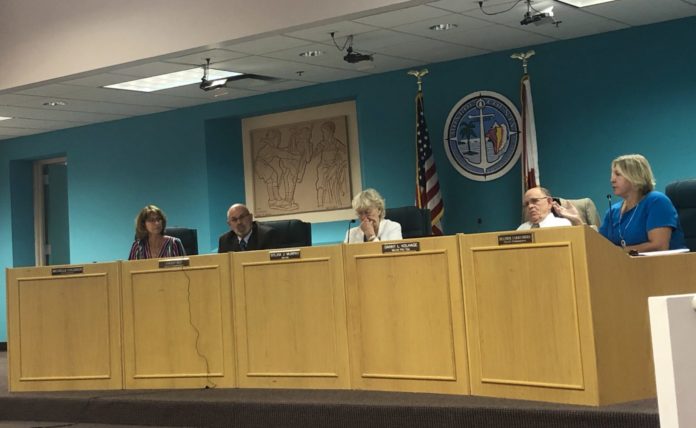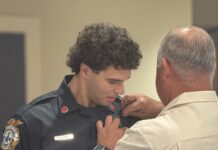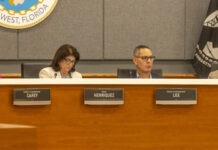
The Monroe Board of County Commissioners convened on Feb. 20 to focus on projects facing the county, most pressingly, FDOT projects Cow Key Channel Bridge and the Cudjoe Tower, as well as FEMA’s flood mapping project. The Commissioners broke to attend the ribbon cutting at the FKSPCA at reconvened to discuss the FDOT projects. The top priority items were as follows:
• KOTS Controversy. The Keys Overnight Temporary Shelter has been threatened with a move for years; however, its new location is now set to be used for low income housing instead—104 one-bedroom, one-bath apartments. The city has promised 30 units to employees of the Sheriff’s Department, and Assistant City Manager Greg Veliz acknowledged that the College Road project would require them to make room elsewhere for KOTS. Commissioners Michelle Coldiron and Danny Kolhage asked if the requirements for the low-income housing might be expanded or reconfigured from the guidelines set forth by the grant to a larger sector of workers (and be applicable to Sheriff’s Department higher paid staff). Veliz acknowledged the income restriction is the “biggest wrinkle” in the plan. Veliz said they were “pretty far down the road” with funding sources and were ready to break ground. Rice was concerned that “almost exclusively” the employees of the sheriff’s office make too much money to live there. Veliz acknowledged that the proposal was not a “long-term housing solution.” Sylvia Murphy asked that they “take KOTS and find a place to put it, where it’s not in the way of the Sheriff’s department.”Teri Johnston spoke, noting that Veliz was speaking under the confines of the previous commission which directed him to go forth with the housing project and acknowledged the need for flexibility.
• FEMA Flood Map. The commission heard from the Coastal Study group to update Flood Insurance Rate maps: “FEMA has been working on revised flood plain maps for several years.” Bruce Bender, consultant for the county, said that the Monroe County data is outdated; the surge analysis is 30 to 40 years old, and the climate data is from the ’70s. He said our storms have increased, and we’ve seen significant land alterations. He said the county will be notified of the new FEMA maps and have the opportunity to dispute scientific or technical differences. Bender offered map changes and how they will affect insurance; the differences will go into effect in the winter of 2020. FEMA will allow grandfathering in insurance for lower rate zones. Commissioner Heather Carruthers mentioned that particularities like the mangroves protecting coastlines and lack of sand beaches are factors that FEMA, as a national agency, may not be taking into account. Citizens voiced concerns about the expense to the community the new maps may bring in insurance fees. The commission voted to move ahead with flood insurance rate maps drafting, due in April.
• Cow Key Channel Bridge. Harold Desdunes, director of transportation development, as well as a team of state Department of Transportation staff, presented. The FDOT team presented evidence of damage, cracks and deficiencies they have assessed because of the “marine environment” on Cow Key Channel Bridge. The bridge was originally built in ’78 and the additional lanes were completed in ’85. They presented slides demonstrating the damage, which at this point is “not reversible.” Their assessment found the root of the damage is saltwater spraying up from Jet Skis. Carruthers said she was “flabbergasted” that a bridge over saltwater was deteriorating because of exposure to saltwater. The construction is projected to cost $5.7 million. They debated models for how to reroute traffic while parts of the bridge are reconstructed. The next public meeting is set for March 20 at 5 p.m. at the Marriott, and the commission requested they change the date. FDOT proposed a mandatory construction start date of April 13, 2020, after tourist season. They said “safety is our priority” and have also analyzed for minimal environmental damage.
• Cudjoe Key affordable housing. A request for amendments to policy of the Monroe County Comprehensive Plan was presented, essentially asking for zoning changes so that a mobile home site might be redeveloped into affordable housing units. Currently at the “Coco’s Cantina site,” Coco Palms Affordable Housing Subarea requested zoning be changed to Suburban/Commercial. It would effectively allow 16 additional affordable housing units, for a total of 33. The grey area is whether Coco Palms would actually build hurricane-resistant and code-compliant units or simply add 17 additional mobile homes, an idea speakers resisted. The commission voted 4-1 to approve.
• FKCC Update. FKCC President Jonathan Gueverra presented a programmatic and strategic update on the college. He discussed the destruction after Hurricane Irma and recovery: “Despite the fact that we lost 27 days to the storm,” he said, “we ended the semester and students graduated on time.” Gueverra discussed expanded housing, meeting the needs of out-of-county and out-of-state students, their Baccalaureate program, and how to further success of graduates. “We prepare people for the workforce and are putting them into jobs that are high-paying and in demand.”



















